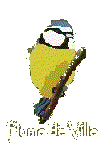Plume de Ville
From day to day.
°°°°°°°°°°°°°°°°°°°°°°° °
August 2009
August 1st
Six-spot
Burnet. [Zygaena filipendula] (La Zygène de la filipendule
or Zygène de la
spirée)
It is seen from afar and it states clearly, "Do not eat me."
This butterfly is a day-flying moth.
6 spots on the fore wings and no band on the abdomen, club shaped antennae.
It is one of the most common Zygaenidae.
(The Filipendula is a spirea, white flowers, pink below ).
http://aramel.free.fr/INSECTES13bis-3.shtml
August 3rd
Common
blue.
[Polyommatus icarus
Lycaenidae-Polyommatinae-](Azuré commun or Argus bleu or
Azuré de la Bugrane)
Pretty blue purple butterfly wings fringed with white.
Beige grey underside
with black spots surrounded by white and orange maculae.
(It has
lots of blue "cousins" of the same type and the confusion is easy for
the amateur that I am.
But I think that this one is the common blue (icarus) because the
fringe of the
wings is completely white (without black stripes) and there is a black
spot on
the fore wing (in the cell) and because it is one of commonest!)
Madam has brown
wings with orange marks. Without marks on top
of the forewings. And it often has blue scales.
Below, the underside of the left butterfly.
Another, even butterfly on both pictures.
(The photo below was previously classified Common
blue female.)
when
I looked at other pictures to recognize the Brown argus, I found this
picture on the left could not be that of the female (!) Common blue!
This butterfly was with Common argus and I automatically put it in the
family (I lacked rigor).
The Common blue does not have marks on the top of the wings,they are
here undeniably visible.
I think it is a Brown argus - [Aricia agestis (Plebeius)-Lycaenidae
Polyommatinae-]
Another photo.
I have not had the underside of wings.
http://www.leps.it/indexjs.htm?SpeciesPages/PolyomIcarus.htm
http://www.leps.it/indexjs.htm?SpeciesPages/AriciAgest.htm
http://www.galerie-insecte.org/galerie/plebeius_agestis.html
http://www.galerie-insecte.org/galerie/polyommatus_icarus.html
http://www.lepinet.fr/especes/nation/lep/index.php?e=l&id=31400#
http://www.lepinet.fr/especes/nation/lep/index.php?e=l&id=31200#
http://www.ukbutterflies.co.uk/species.php?vernacular_name=Common%20Blue
http://www.ukbutterflies.co.uk/species.php?vernacular_name=Brown%20Argus
August 5th
Clouded
yellow. [Colias crocea. Pieridae
Coliadinae] (Souci.)
Usually it perches with the wings closed and in flight it is difficult
to
discern its wings.
Today, these two flutter.
And
for
him, there are no other terms. Monsieur flits around madame, hovers a
little,
tries to attract its attention. A right turn, a left turn, he rises and
makes a
descent towards the belle.
And it work, the female each time opens the wings a moment, to receive
the male
and (happy photographer) for once the obverse is displayed.
Male and female are
almost identical.
Both have a black border at the edge of the wings, larger in females
and dotted
with yellow spots.
The wings are orange yellow.
A real rodeo.
(There is another female form in which the wings are white green with
grey on
the hind wings.)
(5cm)
(Ph. 040809)
More calmly,
here it is feeding on lavender; it is yellow green with a white discal
mark.
This individual is in better condition than our little couple above
which seems
to be seasoned.
(Ph. 200709)
August 12th
Wall lizard. [Podarcis muralis] (lézard des murailles).
Posed
on
his favourite step (it is often there), warming in the sun, next to a
crack
which serves as emergency exit, and where it will disappear in a blink
in case
of danger.
It
has already had a bad encounter. Its tail is a new one; it has a
different
aspect, without scales. He must have had to abandon the original to a
predator.
The cartilage grew to form a new queue (without bones).
Not
far, in the grass, the younger generation wanders.
August 14th
European
green lizard. [Lacerta viridis]
(Lézard vert).
Bright
green, blue throat and yellow belly, here is the male.
Long, very long tail.
In contrast to the wall lizard, he prefers the vegetation to dry stone
and stays
undercover or at the edge of bushes.
(30cm)
His female
is more discreet in his green brown coloured robe.
August 17th
These beautiful
thighs?
They belong to an Oedemera nobilis --
Small metallic gleaming green beetle with long antennae. It keeps its elytra
slightly separated allowing its wing to peep out.
(9 mm)
It is
common and feeds on pollen.
Madam wears also a green coat but stays slim.
170809- Nota: Modification de l'article du 3 août sur l'Argus bleu (voir cette date).



















